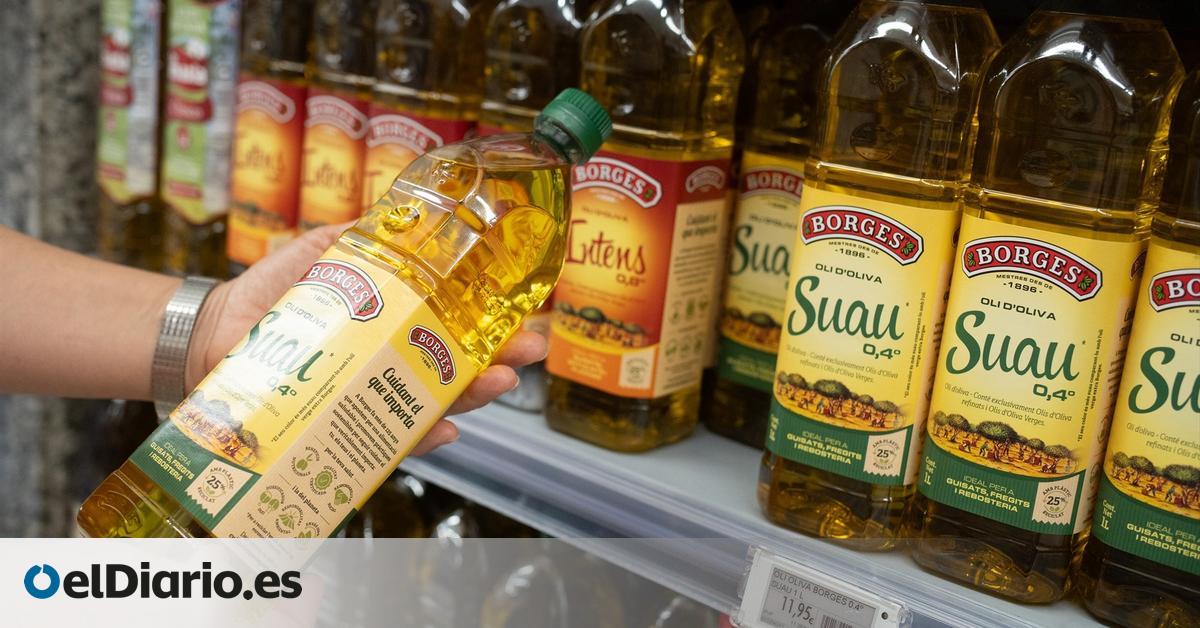
Food inflation eased to 3.1% in July, a nearly three-year low. That’s exactly since October 2021. Prices in supermarkets provided relief to families’ pockets due to lower increases in the price of olive oil and fruit.
The CPI (Consumer Price Index) for food fell by 1.1 points year-on-year, the INE confirmed on Tuesday. That is, food prices rose by 3.1% in July compared to the same month last year. In June, this increase was 4.2%.
Olive oil, which has been rising at a rapid pace (even over 70%) for months, rose in price by just under 40% in July, the lowest year-on-year increase in the last year. Meanwhile, the CPI for “fresh or chilled fruit” fell from 14.4% to 2.2%. In addition, other products became cheaper, such as milk or flour.
On a monthly basis, comparing July prices with those of June, oil prices fell by 5.5%. This is the third consecutive month of declines in the price of liquid ‘gold’.
General inflation falls
For its part, general inflation fell six tenths in July to 2.8% year-on-year, in line with the forecast by the INE. In this case, this is a minimum for the year. The CPI for all products and services moderated from 3.4% year-on-year in June due to the drop in electricity prices and also due to the lower rise in food prices.
With the year-on-year drop in the CPI (again compared to the same month of the previous year), inflation has now fallen for two consecutive months after the increases experienced in March, April and May.
On the other hand, in July, core inflation (excluding unprocessed food and energy products) fell by two-tenths to 2.8%, the lowest rate since January 2022.
In monthly terms (July over June), the general CPI fell by five tenths after six consecutive months of increases. “The inflation data continue to reflect the capacity of the Spanish economy to combine one of the highest economic growth rates among the main countries of the Eurozone, as shown by the GDP growth data for the second quarter, with the moderation of prices,” argues the Ministry of Economy, Trade and Business.
At the end of last month, the coalition government obtained the approval in the Congress of Deputies of the latest anti-crisis decree, approved by the Council of Ministers on June 25, with measures to alleviate the damage of inflation. Among them, the reduction of VAT on olive oil to 0%, the increase in salaries for public officials in 2024 or the extension of the social electricity bonus.
This latest package extends some measures in force since the end of 2023, but eliminates others, “in response to the moderation of inflation” and to comply with the fiscal rules of the European Union (EU), which have been activated in 2024 – according to the Executive – after remaining suspended since 2020 to allow a social response to the double shock of the pandemic and the Russian invasion of Ukraine.
“We have taken measures worth 120 billion euros since 2020. An unprecedented fiscal boost to protect incomes, save jobs and transform the economy,” said the First Vice President, María Jesús Montero. “In the previous financial crisis, outdated austerity measures were applied,” stressed the Minister of Finance.
Anti-crisis measures
One of the major problems addressed by the latest anti-crisis decree approved by the Council of Ministers at the end of June is food inflation. The main measure of the coalition government to alleviate this damage to families, especially the most vulnerable, was the reduction of VAT on basic foodstuffs from the beginning of 2023. This tax reduction was due to expire at the end of this month, but the Executive decided to extend it at the Council of Ministers on June 25, with an extraordinary effort – agreed with Junts – to control the price of oil, which is totally exorbitant in this inflation crisis.
Oil, which has already gone from 10% to 5% VAT since the anti-crisis decree that began to be implemented in January 2023, is now part of the group of basic products – bread, flour, milk, cheese, eggs, fruit and vegetables – that have had a rate of 0% since last year (instead of the 4% that was applied until then) until September 30. From October they will go to 2% VAT, until the end of the year.
The total cost of all the measures taken since 2021 to alleviate the damage of inflation is around 50 billion, with the most expensive measures being those related to electricity (which exceed 20 billion in total: reduction of VAT on bills, excise duty, subsidies to the sector, etc.) and deductions in personal income tax (IRPF).
In fact, in June other measures of the anti-crisis decree that had expired at that time were extended, such as the reduction of personal income tax for families with lower incomes, specifically for those earning the minimum wage (SMI), but which will benefit incomes up to 22,000 gross euros per year. “The sum of the fiscal measures, between VAT and personal income tax, represents a saving of 3,000 million euros per year for families,” said the First Vice President and Minister of Finance.
“We are also extending the social shield for the most vulnerable groups, who also benefit from the previous measures,” added Montero. This social shield includes the prohibition of cutting off water and energy supplies to vulnerable consumers until the end of the year. In addition, the new anti-crisis decree makes the last resort gas tariff (TUR) for communities of owners indefinite.
Meanwhile, VAT on electricity bills for domestic contracts returned in July to the reduced value of 10% with the rise in the wholesale electricity market price above the 45 euro per megawatt hour (MWh) mark, as happened in June, according to the first anti-crisis decree of 2021.
Source: www.eldiario.es

